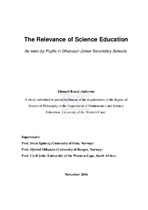| dc.contributor.advisor | Sjøberg, Svein | |
| dc.contributor.advisor | Mikalsen, Øyvind | |
| dc.contributor.advisor | Julie, Cyril | |
| dc.contributor.author | Anderson, Ishmael Kwesi | |
| dc.contributor.other | School of Science and Mathematics Education | |
| dc.contributor.other | Faculty of Education | |
| dc.date.accessioned | 2013-08-06T14:16:26Z | |
| dc.date.available | 2007/06/25 06:19 | |
| dc.date.available | 2007/06/25 | |
| dc.date.available | 2013-08-06T14:16:26Z | |
| dc.date.issued | 2006 | |
| dc.identifier.uri | http://hdl.handle.net/11394/1814 | |
| dc.description | Philosophiae Doctor - PhD | en_US |
| dc.description.abstract | This thesis was based on a larger international comparative study called the ROSE (Relevance of Science Education) project. The study investigated the affective factors pupils perceive might be of relevance for the learning of science and technology using the ROSE survey questionnaire, and was aimed at providing data that might form part of an empirical basis for local adaptation of the science curriculum. | en_US |
| dc.language.iso | en | en_US |
| dc.publisher | University of the Western Cape | en_US |
| dc.subject | Relevance of Science Education Project | en_US |
| dc.subject | Science | en_US |
| dc.subject | Study and teaching (Secondary) - Ghana | en_US |
| dc.subject | Technology | en_US |
| dc.title | The relevance of science education: as seen by pupils in Ghanaian junior secondary schools | en_US |
| dc.type | Thesis | en_US |
| dc.rights.holder | University of the Western Cape | en_US |
| dc.description.country | South Africa | |

